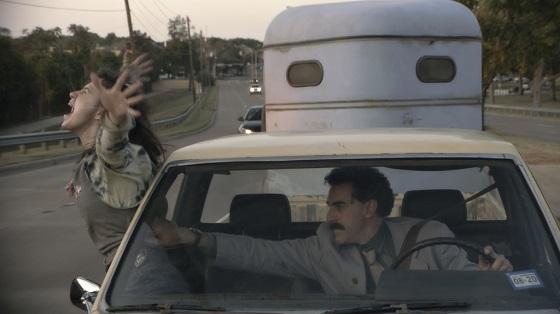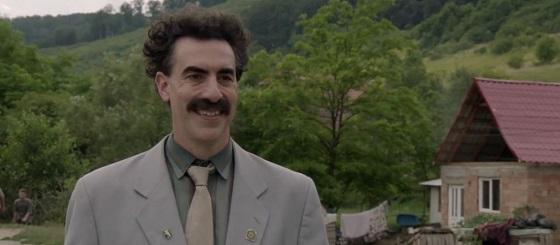

[Rating: Solid Rock Fist Up]
Released on Prime Video on Friday, October 23.
It is true: all of it. Sacha Baron Cohen is indeed back as his most famous alter-ego, Borat, exposing America’s darkest impulses with little more than a nudge and chuckle, and yes, it’s just as crackers as one might expect. A sequel to 2006’s smash hit, this 2020 incarnation titled Borat Subsequent Moviefilm: Delivery of Prodigious Bribe to American Regime for Make Benefit Once Glorious Nation of Kazakhstan might not capture the same lightning in a bottle as its predecessor, but it “plays the hits” in a way that makes for one hell of a good time all the same.
The film doesn’t waste any time getting the audience up to speed on Borat and what he’s been up to in the intervening 14 years since audiences last saw him. Toiling away in a labor camp as punishment for bringing shame to Kazakhstan by way of the first film, Borat’s narration explains how he’s being offered a chance at redemption by his country’s leader. Borat explains that if he can deliver a bribe to Mike Pence and curry favor with America’s strongman regime, all will be forgiven.
Borat’s plans are upended when he arrives in America and learns that his fifteen-year-old daughter, Sandra Jessica Parker Sagdiyev (Maria Bakalova), slipped herself into the shipping crate that had been carrying the bribe. Unable to move forward with his original plans, Borat pivots to a new scheme that will see him offer his kid to the Vice President instead, which opens the door to dozens of jokes about the misogynistic practices of his people (and the Americans who largely shrug off the worst of it). Indeed, when Borat asks a rural supply vendor which cage is the most popular for American fathers shopping for their daughters, the question hardly seems to faze the guy.

The original Borat film got some criticism for its thin structure and narrative, but this isn’t a slight Borat Subsequent Moviefilm should suffer, as the dual thrust of Borat’s redemption project with his father-daughter adventure serve as a sturdy backbone for these events. Although the concept of Borat trying to gift his daughter as a bribe to the American Vice President seems a little whacky on the face of things, it does give Cohen and Bakalova plenty of opportunities to mix with the residents of this country’s famous fly-over states. Cohen’s ability to draw out America’s foundational racism, xenophobia, sexism, and/or predilection for violence during casual conversation is a hallmark of his work, and it has never shined more prominently than in this picture (and with these rubes).
To the film’s credit, the comedy isn’t content to operate on any one level, with gross-out humor (a debutante dance number) mixed liberally with more subtle social commentary (a visit to a women’s health clinic). In the latter case, things feel infinitely more sharp than the first film, with Borat explaining to an anti-abortion clinician why it’s important to get the baby out of his daughter since he is responsible for putting it there (the joke being that the clinician isn’t aware that they’re talking about a plastic cake-topper the girl accidentally swallowed). It is maybe the funniest scene in the film, and it doesn’t need to lean on the cringe-factor or a shock-ambush to land.
Admittedly, there are some moments that don’t hit with the same resonance, like a conversation with an Instagram influencer (is this Macey Chanel woman an actor or a real person?), or an etiquette coach, Dr. Jean Sheffield, who Google can’t seem to find. If one begins to question the legitimacy of these moments, the house of cards begins to fall, but there seems to be enough genuine, real-deal American backwards-ness on display to allay most of these fears. When Borat asks a dessert shop owner to write, “Jews will not replace us” on a cake, or a supply vendor for advice on how many gypsies can be gassed with just one tank of propane, the momentary hesitation followed by casual compliance feels entirely legitimate.

Cohen slips into his trusty Borat character with all the comfort of someone riding a bike after a short break from the saddle, even if his notoriety (cleverly addressed early on in Borat Subsequent Moviefilm) has made his guerilla approach to comedy more difficult. Bakalova is the true standout here, however, outpacing the original sidekick (Ken Davitian) as more than just an accessory to the humor, but rather an integral part of it. The best parts of the film wouldn’t work without her total, focused commitment to each bit, and as Rudy Giuliani learned the hard way, she’s every bit as capable as Cohen when it comes to skewering idiots.
Dropping tomorrow on Amazon Prime, Borat Subsequent Moviefilm is a good time, and has transitioned well from the Bush to Trump era. The political humor is there, to be sure, but it is Bakalova that anchors the richest satire of the piece. After all, how can an audience not laugh when Borat shops for dresses with his daughter and asks, “Where is the no means yes section?” A person giggles instinctively at this, then gasp-chuckles when the salesperson dutifully finds a garment to match the request. This is the rhythm Cohen has developed for his humor over the last 20 years, a sort of chuckle, gulp, wince, guffaw symphony whose composer, from the looks of this one, anyway, still has plenty of ink left in the pen.





Comments on this entry are closed.